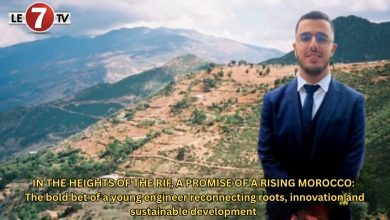OCP Green Water Delivers Key Milestone in Group’s Water Autonomy Strategy
Khouribga – As of July 14th 2025, OCP Green Water has officially put into service the Jorf Lasfar–Khouribga pipeline, a strategic infrastructure that now supplies the world’s largest phosphate mine with desalinated water. The pipeline’s capacity also enables coverage of Khouribga’s drinking water needs.
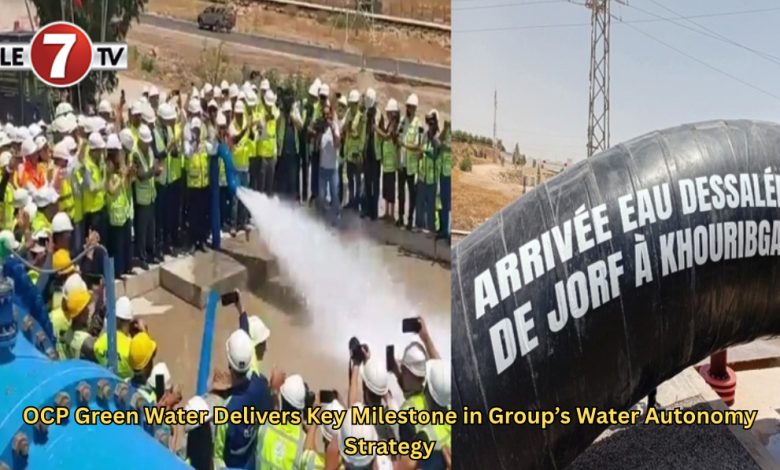
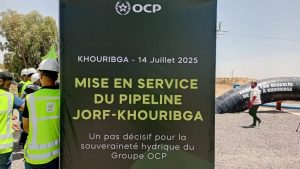
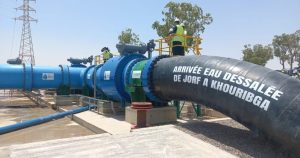
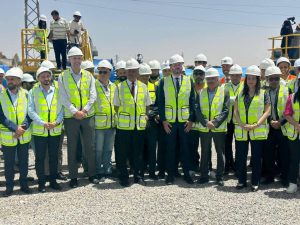


Simultaneously, OCP’s operations at the Benguerir mine have become fully water-autonomous as of June 15, 2025, thanks to the supply of treated wastewater from the Marrakech wastewater treatment plant. With these developments, OCP Group has reached its goal of full autonomy in non-conventional water two years ahead of the original 2027 target.
A subsidiary of OCP Group, OCP Green Water (OGW) is responsible for the development, production, and commercialization of non-conventional water resources. The newly operational J2K pipeline connects the Jorf Lasfar desalination plant to Khouribga, transporting desalinated water over more than 200 kilometers from Morocco’s Atlantic coast to its primary phosphate basin.
This technical achievement is part of OCP’s broader strategy to secure sustainable water autonomy across its industrial operations while contributing to national efforts to alleviate water stress. It reflects the Group’s commitment to combining industrial excellence with social and environmental responsibility.
Responding to a National Water Emergency
OCP Group was called upon by the Moroccan state in 2022 to support national efforts addressing a water emergency that has persisted since 2018. In less than three years, OGW successfully secured potable water for Safi, El Jadida, and southern Casablanca. With the launch of the J2K pipeline, Khouribga is also set to benefit from desalinated water for public consumption in a second phase.
J2K: A Technological Feat Delivered in Record Time
Spanning over 200 kilometers, the J2K pipeline is supplied by a new desalination facility on the Jorf Lasfar platform, built specifically to meet Khouribga’s industrial water needs. The pipeline can transport up to 80 million cubic meters of desalinated water annually, making it the first infrastructure in Morocco to deliver desalinated water over such a long distance.
Designed with support from JESA and global engineering firms, and executed by a consortium of Moroccan companies selected through an international tender, the project was completed in just 24 months. The collaboration between OGW, JESA, and OCP Group, along with international partners, helped overcome major technical challenges to deliver the project on time.
Beyond its technical impact, the project has generated significant economic and social benefits. It created roughly one million man-days of employment, averaging 1,300 jobs per day over two years, with 85% of the workforce hired locally. In its operational phase, it has generated 100 permanent jobs, contributing to regional development.
Benguerir: Supplied by Treated Wastewater from Marrakech
In parallel, OGW also announced the commissioning of a pipeline connecting the Gantour mining site (Benguerir–Youssoufia) to the Marrakech wastewater treatment plant. Operational since June 15, 2025, this project was completed in less than a year, in coordination with the Ministry of the Interior and the Regional Water Utility (SRM) of the Marrakech–Safi region.
The treated wastewater now travels over 80 kilometers to the Gantour site, which has also achieved complete autonomy in non-conventional water. These achievements mark the successful realization of OCP’s water independence goals for 2025, ahead of the original 2027 timeline.
Next Phase: Safi–Gantour Pipeline and Drinking Water for Key Cities
Looking ahead, the next milestone in OGW’s roadmap is the Safi–Gantour (S2G) pipeline, scheduled for commissioning in 2026. This infrastructure will link the new desalination plant in Safi to OCP’s new industrial sites in Mzinda, Benguerir, and Louta, while also securing the potable water supply for Benguerir. Similarly, Marrakech and Youssoufia will be supplied with drinking water via a pipeline from the same desalination plant, in coordination with the Marrakech–Safi regional utility (SRM-MS).
These efforts are part of a broader industrial strategy aligned with Morocco’s national water sovereignty agenda, to which OGW is a key contributor. Its core mission remains the long-term security of non-conventional water for OCP’s mining and industrial operations.
About OCP Green Water
Founded in 2022, OCP Green Water is a subsidiary of the OCP Group dedicated to the development, production, and commercialization of non-conventional water resources for industry, cities, and agriculture. By 2025, OGW reached an installed capacity of 320 million cubic meters, achieving water autonomy across all OCP operations and supplying drinking water to several cities, including Safi, El Jadida, and southern Casablanca. With a planned scale-up to 610 million cubic meters by 2027, OGW will further support industrial expansion and urban water supply, including for Marrakech.
All OGW systems are powered by 100% green energy. The company’s circular water approach is supported by an innovation ecosystem led by Mohammed VI Polytechnic University (UM6P), INNOVX, JESA, and international partners. OGW aspires to lead the water transition across Morocco and Africa, placing science, local communities, and sustainability at the heart of its mission.
Editorial team/le7tv







